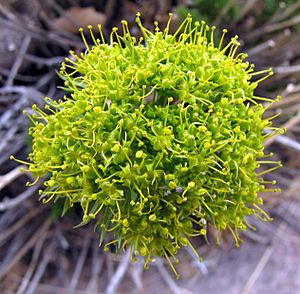Parry's biscuitroot facts for kids
Quick facts for kids Parry's biscuitroot |
|
|---|---|
 |
|
| Flower cluster | |
| Scientific classification | |
| Kingdom: | |
| (unranked): | |
| (unranked): | |
| (unranked): | |
| Order: | |
| Family: | |
| Tribe: |
Selineae
|
| Genus: | |
| Species: |
L. parryi
|
| Binomial name | |
| Lomatium parryi (S.Wats.) J.F.Macbr.
|
|
Parry's biscuitroot, also called Utah desertparsley, is a wild plant that lives for many years. It belongs to the carrot family, just like the carrots you eat! You can often find this plant growing in high desert areas and national parks in the western United States. For example, it grows in the mountains of Death Valley.
This plant is named after Charles Christopher Parry. He was an important botanist who worked for the U.S. Department of Agriculture a long time ago. He helped collect many plants for study.
What Parry's Biscuitroot Looks Like
Parry's biscuitroot grows from a thick root called a taproot. This root helps the plant find water deep in the ground. Its flowering stems are strong and often hollow inside.
The plant usually grows to be about 20 to 40 centimeters tall. That's like the length of a school ruler! Its leaves are at the bottom of the plant and are divided into many small, hairy parts.
Flowers and Fruits
The flowers of Parry's biscuitroot are yellow. They grow in a cluster called an umbel, which looks a bit like an umbrella. These flower clusters are usually only one or two centimeters wide. Like most plants, insects help to pollinate these flowers. This means insects carry pollen from one flower to another, helping the plant make seeds.
After the flowers bloom, the plant produces fruits. These fruits are flat and wide with "wings" on the sides. They are called schizocarps. Each fruit splits into two halves, and each half contains one seed.
How People Used This Plant
Long ago, Native Americans ate Parry's biscuitroot. It was a part of their diet in the areas where it grew.

